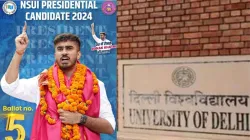Who is DUSU 2024 president Ronak Khatri? Know all about 'Matka Man'
Today, the Delhi University Students' Union (DUSU) election results have been announced. NSUI's candidate Rounak Khatri emerged victorious in the presidential race. Know about him in details in this article.

The Delhi University Students' Union (DUSU) election results finally have been declared. According to the results, the congress-backed National Students' Union of India (NSUI) grabbed the top position of the central panel after seven years. NSUI's candidate Rounak Khatri emerged victorious in the presidential race, defeating RSS-backed Akhil Bharatiya Vidyarthi Parishad's candidate Rishabh Chaudhary by over 1,300 votes. He received got 20,207 votes while Chaudhary trailed with 18,864 votes.
Who is DUSU 2024 president Ronak Khatri?
Interestingly, Raunak is known as the 'Matka Man of DU' because he took the initiative to place pots of water on the college campus during the scorching heat. He also filed a petition in court regarding the water problem on the campus, which eventually led to a solution. Due to his unique campaigning style and commitment to students' rights, he gained popularity among students. According to NSUI, he aims to bring transparency and fairness to DUSU with his legal and dynamic leadership. His father is a businessman and his mother is a homemaker.
Raunak's journey into politics began in 2024 when he joined the National Students' Union of India (NSUI). Before this, he wasn't associated with any political party. His slogan 'From the countryside to DU' reflects his commitment to student welfare.
ALSO READ | DUSU Election Result: NSUI wins President and Joint Secretary posts, ABVP also secures two
DUSU Election Result 2024 Highlights
DUSU elections 2024 took place on September 27, wherein 1.45 lakh eligible candidates participated in the election. The process of announcing the DUSU Election results was delayed due to the defacement of public property by DUSU candidates. Initially, the results were scheduled to be announced on September 28, but the process faced delays due to legal and procedural hurdles. Electronic Voting Machines (EVMs) were used for electing the central panel members including the president, vice president, secretary, and joint secretary, which were stored in a strong room with 24-hour police monitoring for two months.